经贸专业英语报刊阅读教程 第二课 Global Economic Forum to Expand Permanently
经贸英语阅读自学考试大纲

经贸英语阅读自学考试大纲辽宁省高等教化自学考试委员会一、经贸英语阅读性质和目经贸英语阅读是经贸英语专业〔本科段〕自学考试必修科目。
在理论上应与全日制一般高等院校经贸英语专业相应程度相当。
根据国家对高等学校经贸英语专业在校学生要求和规定,高等教化自学考试经贸英语专业经贸英语阅读任务是:用英语传授经济贸易根底理论和根底学问,对自学者进展全面、严格经贸根底理论教化,经贸专业英语语言技能培训,使自学者既驾驭经济贸易学问,又能用英语进展经贸工作,阅读有关经济信息和最新开展报道。
同时根据自学考试特点,着重考核应试者用英语阅读和说明有关经济贸易根本理论和根底学问实力。
二、教材各章节主要内容及应重点驾驭内容第一章International Trade课文A:International Trade重点:〔1〕Why Countries trade?〔2〕World Trade Patterns〔3〕International Trade Theories〔4〕Some Terms〔5〕Explanatory Notes课文B:The European Union重点:〔1〕history〔2〕growth of membership〔3〕EU policies第二章Economics课文A:Economics重点:〔1〕history of economic thought〔2〕macroeconomics〔3〕some important people and their major theories in the field of economics〔4〕theories of capital〔5〕Explanatory Notes课文B:National Economy重点:〔1〕the circular flow of income and output 〔2〕Keynesian theory第三章Management课文A: Overview of Business Management重点:〔1〕Types of businesses〔2〕business operations〔3〕Corporate Finance〔4〕Explanatory Notes课文B:Corporation重点:〔1〕development of the corporation〔2〕multinational corporations第四章Marketing课文A:International Marketing重点:〔1〕fundamentals〔2〕international pricing〔3〕Marketing〔4〕Explanatory Notes课文B:Advertising重点:〔1〕introduction〔2〕direct advertising第五章Financial Management课文A:Banking重点:〔1〕commercial banking〔2〕banking in Britain and in developing countries 〔3〕roles of banking〔4〕The Asian Financial Crisis〔5〕Explanatory Notes课文B: Credit重点:〔1〕types and function of credit〔2〕credit and the economy第六章Insurance and Arbitration课文A:Insurance重点:〔1〕reasons for and importance of insurance 〔2〕types of insurance〔3〕history of insurance〔4〕Explanatory Notes课文B:Arbitration重点:〔1〕labor arbitration〔2〕commercial arbitration第七章Accounting and Statistics课文A:Accounting重点:〔1〕accounting information〔2〕accounting principles〔3〕bookkeeping〔4〕Explanatory Notes课文B:Statistics重点:〔1〕What is statistics〔2〕statistical methods第八章Taxation and Budget课文A:Taxation重点:〔1〕types of taxes〔2〕principles of taxation〔3〕Explanatory Notes课文B:Budget重点:〔1〕budgetary process〔2〕fiscal policy第九章Information Technology课文A: Computer Science重点:〔1〕the development of computer science 〔2〕major branches of computer science〔3〕Explanatory Notes课文B: Internet重点:〔1〕What is internet〔2〕how the internet works第十章Intellectual Property课文A:Intellectual Property重点:〔1〕forms of intellectual property〔2〕What is patent〔3〕U.S Patent Law〔4〕Explanatory Notes课文B:Copyright重点: 〔1〕copyright in the United States〔2〕international copyright第十一章The International Legal Environments课文A:Fundamentals of Law重点:〔1〕What is law〔2〕development of law〔3〕types of contracts〔4〕Explanatory Notes课文B:Civil Law重点:〔1〕characteristics of civil law〔2〕Historical development第十二章International Human Resources Management课文A:International Human Resources Management重点:〔1〕IHRM and organizational structure〔2〕Internationalization and the Single European Market 〔3〕European Approach to HRM〔4〕Explanatory Notes课文B:HRM in International Management Development 重点:〔1〕developing International Management skills 〔2〕essential characteristics of an International Manager 〔3〕Explanatory Notes第十三章International Investment and Technology Transfer 课文A:Direct Foreign Investment重点:〔1〕motivation for DFI〔2〕Theories of International Investment〔3〕Explanatory Notes课文B:International Technology Transfer重点:〔1〕fundamentals〔2〕methods and implications第十四章Trade in Services课文A:General Introduction to Trade in Services重点:〔1〕nature of trade in services〔2〕barriers to Trade Services〔3〕Explanatory Notes课文B:GATS: the Uruguay Round Accord on International Trade and Investment in Services重点:〔1〕the Importance of Services Trade and Investment〔2〕The General Agreement on Trade in Services三、命题原那么经贸英语阅读课程考试主要检查考生对本大纲所规定重点学习内容及相关内容记忆和理解。
英文报刊国际商务阅读(第二版)Lesson (2)

英文报刊国际商务阅读(第二版)
28. crater: n., v. 凹陷,下降
A crater
29. the authorities: n.(复数)当局,官方
30. ensue: vi. 跟着发生 31. money supply: 货币供给 是指某一国或货币区的银行系统向经济体中投入、 创造、扩张(或收缩)货币的金融过程。 32. securities: n.(复数)证券
20. chip-maker: 芯片制造商 chip: n. 芯片 21. the two major stock markets in China: 指 中国的上海证券交易所和深圳证券交易所
英文报刊国际商务阅读(第二版)
22. trigger: vt. = trigger off 触发,引起 The report has triggered a fierce response from the governor. 报道引起了州长的强烈反应。 The racial killings at the weekend have triggered off a wave of protests throughout the country. 周末发生的种族屠杀引发了全国上下一片抗 议示威活动。 23. sell-off: n. 抛售
英文报刊国际商务阅读(第二版)
18. Procter & Gamble: 宝洁公司 简称P&G,是一家美国消费日用品生产商,也是目 前全球最大的日用品公司之一。总部位于美国俄亥 俄州辛辛那堤(Cincinnati , Ohio ),全球员工近 110,000人。2008年,宝洁公司是世界上市值第6大 公司,世界上利润第14大公司。我们身边很多著名 的品牌就是宝洁公司的产品,如吉列(Gillette )、 佳洁士(Crest)、欧乐B(Oral-B)、碧浪 (Ariel )、汰渍(Tide)、飘柔(Rejoice )、 海飞丝(Head & Shoulders)、潘婷(Pantene )、 沙宣(Sassoon )、伊卡璐(Clairol)、舒肤佳 (Safeguard)、护舒宝(Whisper)、帮宝适 (Pampers)、SK-II、Olay等。
英文报刊国际商务阅读(第三版)Unit (2)

英文报刊国际商务阅读(第三版)
12. budget: v., n. 预算 budget deficit预算赤字 budget surplus预算盈余 This year’s budget for AIDS prevention probably won’t be much higher. 今年用于防治艾滋病的预算很可能不会比往年高得多。 The company has budgeted $10 million for advertising. 公司已经做了1 000万美元的广告预算。 The movie is only budgeted at $10 million.
英文报刊国际商务阅读(第三版)
Rank
National Flag
Country
GDP $ million
1
the United States
16,799,700
2
China
9,181,377
3
Japan
4,901,532
4
Germany
3,635,959
5
France
2,737,361
6
the United Kingdom 英文报刊国际商务阅读(第三版)
共和党标志
英文报刊国际商务阅读(第三版)
民主党标志
10. the Pentagon: 五角大楼 是美国国防部所在地,位于华盛顿西南的弗吉尼亚州阿灵 顿县。由于其特殊的职能,所以有时“五角大楼”一词不仅 仅代表这座建筑本身,也常常用作美国国防部、甚至美国军 事当局的代名词。
美国五角大楼
美国国防部徽章
英文报刊国际商务阅读(第三版)
15. take-home pay: 扣税后的实得工资 16. fluctuate: vi. 波动;涨落 The price of vegetables fluctuates seasonally. 蔬菜的价格随季节变动。 Body temperature can fluctuate if you are ill. 人患病后体温可能会上下波动。
经贸英语阅读完整复习资料.doc

U11、信用紧缩的后果之一就是贫富差距进一步扩大。
As a consequence,,the credit crunch widened the disparity between the wealthy and the rest 3、次债危机过后,很多人已难以获得按揭贷款。
After subprime meltdown,getting a mortgage has been put out of the reach of many people.U23、金融吃紧,很可能会波及欧元区的经济弱国,进而对意大利形成潜在威胁。
The financial strains could become systemic across the weaker members of the eurozone ,and infecting potentially even Italy.4、商业银行包销了日本政府为减缓地震恐慌而发行的国债。
The commercial banks underwrote all the bonds issued by Japanese government against the earthquake. Panic.U32、这家设计公司把所有的计算技术工作都报给别家公司去做。
The projecting firm outsources all its computing work.3、供过于求,造成产品大量积压。
Production has outpaced demand,and a lot of products have been lying in the stock.U41、今年全国产出上涨远远高于趋势增长率。
National output has risen well above its trend trend rate this year.4、许多企业正试图利用繁荣的股市来募集扩张资金。
经贸英语阅读教程Text 2(3)

Text 2 Q&A on a Sadly Predicable Debt Crisis
I. Related Words and Expressions capital expansion default on debt creditor intermediaries bankruptcy subprime mortgage risk capital monetary policy fiscal policy risk premium deflation liquidity balance sheet contract speculator down payment
II. Notes to the Text 1. securitized financial market 证券化的金 融市场 Securitization means the creation of financial instruments by combining other financial assets and then selling them to investors in the new form. Mortgages can be securitized, as can future royalties from a pop star's song portfolio. The new instruments can then be traded.
5. paternalist
家长主义者,家长作风的人 Someone in authority making decisions for other people which are often beneficial but which prevent those people from taking responsibility for their own lives.
经贸英语报刊阅读习题答案.

C. 1. 楼房设计很少考虑能效,因为建造者不用为之买单,而那些楼 房的住户们买房时考虑的是景色或楼房的外观,而不是它们的能 效。 2. 只有政府要求,或是(通过碳定价)对污染产品和工艺征税, 或进行清洁生产补贴,公司才会投资清洁技术。 3. 碳价需要定在40美元,到2050年翻一番,结合电器标准和研 发扶持等非价格政策,才能达到450ppm的目标。 4. 公司间可以买卖分配额,也可以按照京都“清洁发展机制”从 发展中国家购买“核证的减排量”,以符合减排限制。 5. ETS(排放交易制度)虽然建立不久,但它对(温室气体)排 放带来了一定的影响。
Key—unit3
Part VI 1. spiraled 2. subject to 3. disputes 4. initiative 5. triggered 6. offset 7. in line with 8. inflicted 9. launched 10. submit to B. 1. to gradually but continuously get worse 2. to cause, to bring about 3.to be forced to be lower than the price which can fully cover production and sales costs 4. to be levied antidumping tariffs 5. to affect, to be relevant to 6. without being required to do so 7. went out of its way to demand the highest antidumping tariffs on Chinese solar panels 8. to yield or surrender (oneself) to
《英语经贸文章阅读教程》U2 PPT

课文学习
Business terms
tumbling exports (para. 1) the drying-up of foreign finance (para. 1) emerging economies (para. 1) net private capital flows (para. 2) global trade volumes (para. 2) open market (para. 2) boost domestic demand (para. 3) the flight of private capital (para. 3) current-account deficits (para. 3) a drought of financing (para. 3) 出口锐减 外资枯竭 新兴经济体 私有资本流动净值 全球贸易额 公开市场 扩大内需 私人资本外逃 经常账户逆差/赤字 融资匮乏
•6
The novel A farewell to Arms was written by a famous American writer Ernest Hemingway.
Question: What idea does the author want to convey by using this title, “Farewell, Free Trade”?
•8
热身练习
Warm-up activities
1. Preview work:Read and think.
Before we study the unit, please skim the text and raise two questions on either the content or the language.
商务英语阅读(第二版)-王关富Unit2The-World-Economic-Forum-课后答案
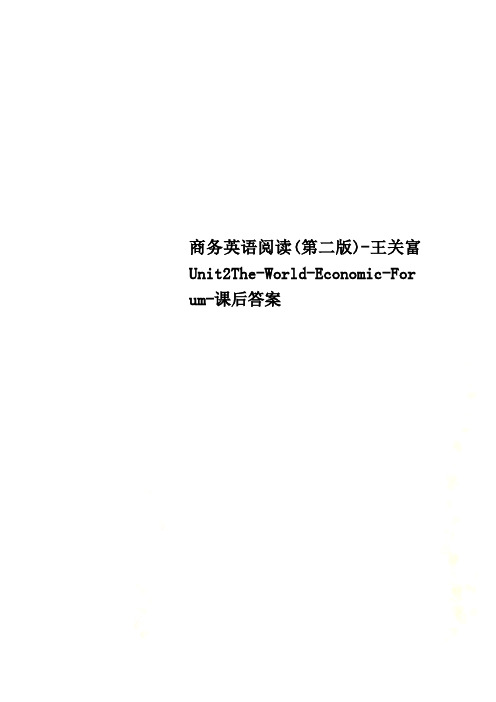
商务英语阅读(第二版)-王关富Unit2The-World-Economic-For um-课后答案Unit 2A Changed Global RealityExercises1. Answer the questions on the text:1) What are the features of the two major economies that the world has seen formore than 200 years?One has dominated technological innovation and trade and amassed great wealth. The second—much of it politically under the thumb of the first—has remained poor and technologically dependent.2) How much did low-and-middle-income countries contribute to world growthin 2010?Almost half (46%)3) Taking a long term view, why is it good news that developing countries aregrowing fast?As billions of poor people become more prosperous, they will be able to afford comforts their counterparts in the rich world have long considered the normal appurtenances of life.4) What are the worst-case scenarios that Europe has so far avoided?A collapse of the euro, a debt crisis that spills from small economies such asGreece and Ireland to much bigger ones like Italy and Spain, and bitter social unrest in those nations that are having to massage wages down while cutting public budgets.5) Why does Jim Walker think that 2011 will be a “year of reckoning”?Because Jim Walker thinks that the rebound in the US is a mirage created by excessive stimulus. He expects the US to slip into the double dip it dodged in 2010.6) Why has the private-sector debt crisis of 2008-2009 morphed into apublic-sector debt crisis in 2010-11?It has been the result of the debt and deficits amassed in the process of stimulating economies and bailing out banks during the downturn.7) What are the risks that emerging economies face?a. sharp rise in inflationb. rising oil pricesc. soaring food price8) What did China and India do to cope with inflation and rising food prices?China raised the reserve-requirement ratio;India resorted to diplomatic means when Pakistan temporarily cut off some exports of onions to the country.9) How can the disaffection with global capitalism in the developed world beprevented from turning into a backlash against it?It would help if there were mechanisms in place to manage the stresses in the international economy.10) What is the most serious division between countries that policymakers haveto contend with?Economic disparity2.Fill in each blank of the following sentences with one of the phrases in the listgiven below:1) The search for the child was scaled back sharply today, with almost a third ofthe volunteers heading home.2) The former Federal Reserve Chairman says there is a risk that the US couldslip into a recession by year’s end.3) The CEO of the firm said that they would switch priority from traditionallabor-intensive products to more hi-tech and value-added ones.4) In the aftermath of the financial crisis the group has put on hold some of itsambitious regional expansion plans.5) Toyota Motor Corp. is offering widespread job buyouts to its US workers for the first time and cutting the workweek at some of its American plants by 10% to contend with falling sales.6) Eventually, it must morph into a system that functions on stability, or it willfail and cause an unstoppable breakdown and widespread hardship.7) Unfortunately most of the central banks in the world today are still firmlyunder the thumb of politicians.8) The stock market’s endurance could depend heavily on whether economic andcorporate performance remains uncertain, or begins indicating that the economy truly is out of the woods.9) Survivors were encouraged to talk about their horrible experiences to helpthem come to terms with the flood disaster.10) Other countries—notably Australia—have also avoided a bust in theirhousing markets, and have instead seen prices increases flatten out.3.Match the terms in column A with the explanations in column B:AB ______1)double-dip recession A) A physical substance, such as food, grains, andmetals, which is interchangeable with anotherproduct of the same type, and which investors buyor sell, usually through future contracts 72) credit rating B) A measure that examines the weighted average ofprices of foodstuffs, often used as an importantfactor to assess the cost of living. 93) austerity C) A government policy of deficit-cutting, lowerspending, and a reduction in the amount of benefitsand public services provided, sometimes coupledwith increases in taxes to pay back creditors toreduce debt. 34) private sector D) A central bank regulation that sets the minimumreserves each commercial bank must hold tocustomer deposits and notes. 105)protective tariff E) The part of the economy that is not statecontrolled, and is run by individuals and companiesfor profit. 46)beggar thy neighbor F) An expression in economics describing policy thatseeks benefits for one country at the expense ofothers. Such policies attempt to remedy theeconomic problems in one country by means whichtend to worsen the problems of other countries. 6 7) commodity G)A published ranking based on detailed financialanalysis by a credit bureau, of one’s financialhistory, specifically as it relates to one’s ability tomeet debt obligations. 28)sovereign-debt crisis H) A crisis in which a national government owes somuch debt that it is unable to repay or on the edgeof bankruptcy. 89)food-price index I) A tariff which tries to ban imports to stop themcompeting with local products 510)reserve requirement J) A situation where economic growth slides back tonegative after a short-lived growth and theeconomy may move into a deeper and longerdownturn. 14.Translate the following into Chinese:星期五,世界上20个主要经济体的领导人结束了在这座东北亚首都城市举行的为期两天的峰会。
经贸专业报刊阅读 翻译 UNIT1-6

Unit 11.buildings are rarely designed to save energy,because those who putthem up do not usually pay the bills and those who occupy them choose them for their views or their looks , not their energy-efficiency.楼房设计很少考虑能效,因为建造者不用为之买单,而那些楼房的住户们买房时考虑的是景色或楼房的外观,而不是它们的能效。
2.that will happen only if governments require them to do so ,or taxdirty products and processes (through a carbon price),or subsidise clean ones .只有政府要求,或是(通过碳定价)对污染产品和工艺征税,或进行清洁生产补贴,公司才会投资清洁技术。
3.a $40carbon price now ,doubling by 2050, and combined withnon-price policies such as appliance standards and R&D support ,is needed to hit the 450ppm targets .碳价需要定在40美元,到2050年翻一番,结合电器标准和研发扶持等非价格政策,才能达到450ppm的目标。
panies can buy and sell allocations amongst themselves ,and canalso buy “certified emission reductions “from developing countries to meet their caps through Kyoto’s “clean development mechanism”.公司间可以买卖分配额,也可以按照京都“清洁发展机制”从发展中国家购买“和政的减排量”,以符合减排限制。
外刊经贸知识选读第2课

第 2课中国吸收外国直接投资The Curtain Goes up 竹幕卷起一、课文翻译中国政府允许外国在沿海投资― 从而差生了不同的法则并引起困惑。
1. 满怀信心的中国卷起大部分竹幕,向世界宣布“对外开放”,几乎所有的城市都张挂起邀请外商来投资作正当生意的招牌。
2. 广东省和福建省的4个经济特区、14个沿海开放城市(都是以前的通商口岸)和海南岛(总共十九个“开放”区)为外国投资者制定了税收和其他方面的鼓励政策。
每一个省会都在尽力吸引外资。
3. 所有这一切的基础是从1979年中期国务院决定在南方建立4个经济特区开始,尔后逐步形成的。
此后首次出台一项合资企业法(尽管充满漏洞),继之就是“补偿贸易”程序----两者都是为吸引外资到这4个经济特区而制定的。
第二年合资企业税法颁布实施。
4. 尽管商人们努力与拥有10亿人口的潜在市场做生意而与官僚主义作斗争,但中国领导人对于深圳----这个经济特区的典范----前进的步伐变得越来越不耐烦了。
5. 1984年4月,在中国高层领导人访问了深圳、珠海和厦门经济特区之后,国务院宣布沿整个海岸的14个城市再加上海南岛对外开放投资,从此把真正的竞争因素引入中国经济发展的计划中。
接着,备受公众注目的《关于经济结构改革的决定》出台,吸收外国技术和外资的竞争骤然开始。
6. 对于外商来说,进入拥有10亿消费者市场的前景不再是白日梦。
中国人---尤其是农村人口---正变得富有,他们希望其生活水平有明显的改善:他们渴望拥有彩电、冰箱、卡车、洗衣机和更好的收音机、自行车和衣服。
即使是地方厂商也注意到国内市场潜在的巨大销售量。
7. 最近,中国沿海城市经济技术开发集团---19个“开发区域”政策制定和协调机构领导人、国务委员谷牧宣布整个沿海对外开放投资。
从字面上理解,这并没有多大意义,因为还没“开放”的沿海地区还不能满足外商的需求。
事实上,经济特区中的汕头,14个沿海城市中的一些城市,再加上海南岛,甚至不具备履行中央政府授予的职责所需的行政支持或基础设施。
国际贸易与金融II(双语)课程国际金融1

FIGURE 10.1 International payments process
15
Balance-of-Payments Structure
Current account of the balance of payments
Monetary value of international flows:
residents
9
Double-Entry Accounting
U.S. debit transaction (-)
Merchandise imports Transportation and travel expenditures Income paid on the investments of foreigners Gifts to foreign residents Aid given by the U.S. government Overseas investment by U.S. residents
Deficit
Balance on a sub-account (sub-accounts) is negative
13
International payments process
In theory
Importers in a country pay the exporters in that same country in the national currency
Payments(Chapter 5) Exchange-Rate Systems and Currency Crises(Chapter 6) Macroeconomic Policy in an Open Economy (Chapter 7) International Banking: Reserves, Debt and Risk
英文报刊国际商务阅读第二版课后练习题含答案
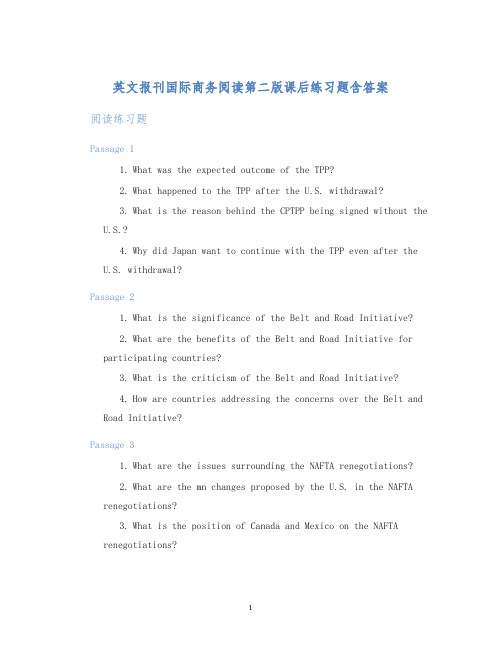
英文报刊国际商务阅读第二版课后练习题含答案阅读练习题Passage 11.What was the expected outcome of the TPP?2.What happened to the TPP after the U.S. withdrawal?3.What is the reason behind the CPTPP being signed without theU.S.?4.Why did Japan want to continue with the TPP even after theU.S. withdrawal?Passage 21.What is the significance of the Belt and Road Initiative?2.What are the benefits of the Belt and Road Initiative forparticipating countries?3.What is the criticism of the Belt and Road Initiative?4.How are countries addressing the concerns over the Belt andRoad Initiative?Passage 31.What are the issues surrounding the NAFTA renegotiations?2.What are the mn changes proposed by the U.S. in the NAFTArenegotiations?3.What is the position of Canada and Mexico on the NAFTArenegotiations?4.What is the possible impact of NAFTA renegotiations on theU.S. economy?答案篇Passage 11.The expected outcome of the TPP was to promote economicgrowth and create jobs, increase market access, establish a rules-based trade system, and encourage investment.2.After the U.S. withdrew from the TPP, the remning 11countries renegotiated the agreement and signed the CPTPP(Comprehensive and Progressive Agreement for Trans-PacificPartnership) in March 2018.3.The reason behind the CPTPP being signed without the U.S.was that the remning countries, including Japan and Canada, saw the economic and strategic benefits of the agreement and did not want to abandon the agreement altogether.4.Japan wanted to continue with the TPP even after the U.S.withdrawal because it saw the agreement as a crucial component of its economic and strategic policies in the Asia-Pacific region. Passage 21.The Belt and Road Initiative is a global infrastructuredevelopment strategy initiated by China that ms to connectcountries in Asia, Europe, and Africa through a network of roads, rlways, ports, and pipelines.2.The benefits of the Belt and Road Initiative forparticipating countries include increased investments, jobcreation, infrastructure development, and trade opportunities.3.The criticism of the Belt and Road Initiative includesconcerns over debt sustnability, environmental and social impacts, lack of transparency, and geopolitical risks.4.Countries are addressing the concerns over the Belt and RoadInitiative through negotiations and consultations, promotingtransparency and governance, and implementing environmental and social safeguards.Passage 31.The issues surrounding the NAFTA renegotiations include thetrade deficits between the U.S. and its NAFTA partners, the low labor and environmental standards in Mexico, and the operation of the dispute resolution mechanisms.2.The mn changes proposed by the U.S. in the NAFTArenegotiations include stricter rules of origin for automobiles, increased labor and environmental standards, and eliminating the dispute resolution mechanisms.3.Canada and Mexico both want to preserve the NAFTA agreementand are willing to make some changes to address U.S. concerns, but they are opposed to the U.S. demands for significant changes.4.The possible impact of NAFTA renegotiations on the U.S.economy could include increased job opportunities in some sectors but also higher prices for consumers and reduced exports due to trade disruptions.。
经贸英语阅读教程Text 3(3)
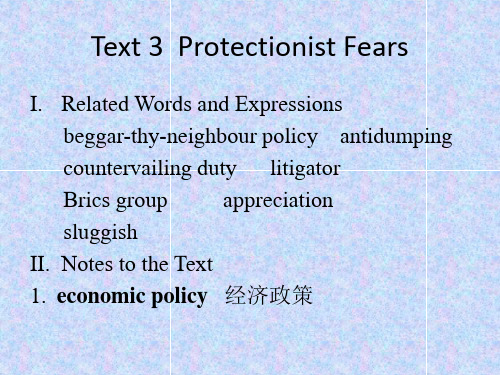
4. unemployment the number of people in a particular country or area who cannot get a job 失业;失业率;失业人数 unemployment可以构成如下相关短语: high/low unemployment rising/falling unemployment rise/increase/growth in unemployment fall/decrease in unemployment level of unemployment/unemployment level unemployment rate unemployment figures/statistics
外刊经贸知识选读第二课课件
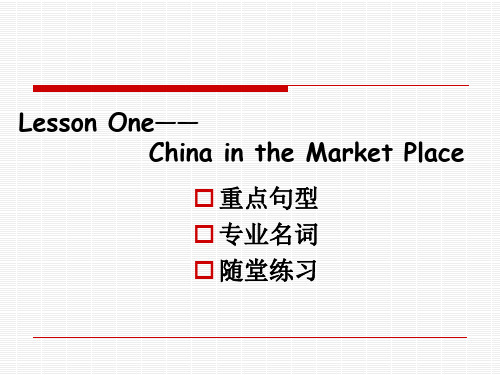
placed emphasis on the development of heavy industry. 20世纪50年代,中国向前苏联和东欧各国出口农产 品以换取制成品和国家的工业化计划所要求的资本设 备,而国家的工业化计划则强调重工业的发展。
——专业名词——
foreign trade:外贸 USSR:Union of Soviet Socialist Republics
(苏维埃社会主义共和国联盟) in return for:换取,作为……回报 manufactured goods:制成品 capital equipment:资本设备 place emphasis on:强调 heavy/light industry:重/轻工业 industry/industrial:工业/工业的 agriculture/agricultural:农业/农业的 exacerbate 【ig‘zæ səbeit】:加剧
在文化大革命期间,外贸的增长又一次被打 断了。当时农业和工业生产急剧下降,运输 管制变的更严重。
——专业名词——
withdrawal:撤走 aid:援助 shift away from:转移 disrupt:打断 agricultural and industrial production:工业和农业生产 transportation constraints:运输/交通管制 Four Modernizations programme:四个现代化项目 in the wake of:紧紧跟随 come into force:生效 Most-favored nation treatment/status:最惠国待遇/地位
大学商务英语阅读教程unit 2

Background & Gist
•the Great Depression:大萧条(1930s) •Keynesianism:凯恩斯主义 •IMF:(联合国)国际货币基金组织 •the World Bank:世界银行 •WTO:世界贸易组织 •draw to a close:接近尾声 •“Allied” nations:同盟国 •a system of rules:一系列规则 •postwar global economy:战后世界经济 •New Hampshire:新坎布什州 •Bretton Woods Conference:布雷顿森林体系 •fixed exchange rate:固定汇率 •reserve currency:储蓄货币 •trade deficits:贸易逆差
•the prevailng rate:盛行利率 •debtor countries:债务国 •gold standard:金本位 •movement of capital:资本流动 •International Bank for Reconstruction and Development (IBRD):国际复兴开 发银行 •viable markets: 可行市场 •“stages of growth economic” theory:经济成长阶段论 •hydroelectric projects:水电工程 •concessional lending rates:优惠贷款利率 •loan repayments:外债 •International Development Association(IDA):国际开发协会 •soft loans:优惠贷款 •Multilateral Insurance Guarantee Agency:多边保险保障机构
外刊经贸知识选读全部课文翻译
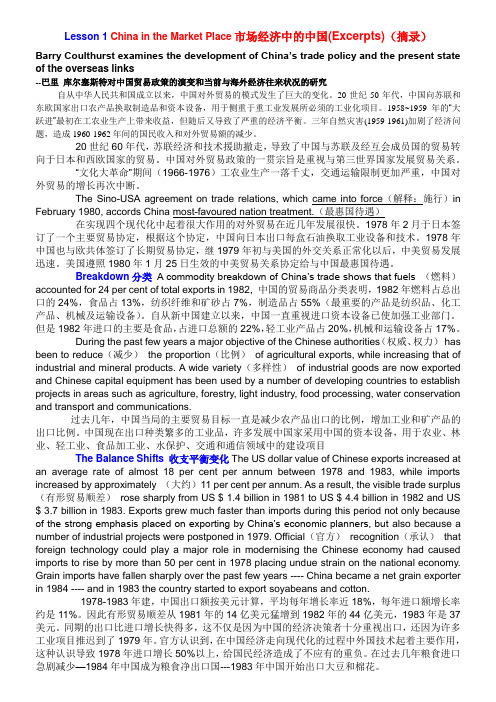
Lesson 1 China in the Market Place市场经济中的中国(Excerpts)(摘录)Barry Coulthurst examines the development of China’s trade policy and the present state of the overseas links--巴里库尔塞斯特对中国贸易政策的演变和当前与海外经济往来状况的研究自从中华人民共和国成立以来,中国对外贸易的模式发生了巨大的变化。
20世纪50年代,中国向苏联和东欧国家出口农产品换取制造品和资本设备,用于侧重于重工业发展所必须的工业化项目。
1958~1959年的“大跃进”最初在工农业生产上带来收益,但随后又导致了严重的经济平衡。
三年自然灾害(1959-1961)加剧了经济问题,造成1960-1962年间的国民收入和对外贸易额的减少。
20世纪60年代,苏联经济和技术援助撤走,导致了中国与苏联及经互会成员国的贸易转向于日本和西欧国家的贸易。
中国对外贸易政策的一贯宗旨是重视与第三世界国家发展贸易关系。
“文化大革命”期间(1966-1976)工农业生产一落千丈,交通运输限制更加严重,中国对外贸易的增长再次中断。
The Sino-USA agreement on trade relations, which came into force(解释:施行)in February 1980, accords China most-favoured nation treatment.(最惠国待遇)在实现四个现代化中起着很大作用的对外贸易在近几年发展很快。
1978年2月于日本签订了一个主要贸易协定,根据这个协定,中国向日本出口每盒石油换取工业设备和技术。
1978年中国也与欧共体签订了长期贸易协定,继1979年初与美国的外交关系正常化以后,中美贸易发展迅速。
美国遵照1980年1月25日生效的中美贸易关系协定给与中国最惠国待遇。
- 1、下载文档前请自行甄别文档内容的完整性,平台不提供额外的编辑、内容补充、找答案等附加服务。
- 2、"仅部分预览"的文档,不可在线预览部分如存在完整性等问题,可反馈申请退款(可完整预览的文档不适用该条件!)。
- 3、如文档侵犯您的权益,请联系客服反馈,我们会尽快为您处理(人工客服工作时间:9:00-18:30)。
Global Economic Forum to Expand PermanentlyBy EDMUND L. ANDREWSPublished: September 24, 2009PITTSBURGH —President Obama will announce Friday that the once elite club of rich industrial nations known as the Group of 7 will be permanently replaced as a global forum for economic policy by the much broader Group of20 that includes China, Brazil, India and other fast-growing developing countries, administration officials said Thursday.The move highlights the growing economic importance of Asia and some Latin American countries, particularly since the United States and many European countries have found their banking systems crippled by an economic crisis originating in excesses in the American mortgage market.For more than three decades, the main economic group was the Group of 7 — the United States, Britain, Canada, France, Germany, Italy and Japan. During the Clinton years, Russia was gradually added, not because of the size of its economy, but to help integrate it with the West. Administration officials said the group would still meet twice a year to discuss security issues. But for practical purposes, the smaller group will become more like a dinner club that defers to the broader group on the economic issues that have dominated summit meetings for nearly three decades. The development, as Mr. Obama was hosting a summit meeting here for leaders of the Group of 20 — 19 countries and the European Union—also highlighted the lingering disparity between the elite group of mostly Western powers and the mass of poorer nations. For al l of Mr. Obama’s talk about greater inclusiveness for countries like Brazil and China, the meeting in Pittsburgh remains dominated by the financial crisis that began in the United States and has preoccupied the old boys’ club.The issue that many developing countries feel much more strongly about —knocking down barriers to trade, especially in politically sensitive sectors like agriculture — is barely likely to be part of the official discussions.Rather, the packed agenda includes proposals to raise capital requirements for financial institutions, rein in executive compensation and reduce imbalances between shop-till-you-drop countries like the United States and export behemoths like China, Germany and Japan.Even as Mr. Obama participated in his first Group of 8 meeting in July inL’Aquila, Italy, he seemed to have doubts about its suitability as a forum for solving the world’s problems. At the time, his aides characterized the session as merely a way station between Group of 20 meetings.“We view this meeting and this dis cussion as a midpoint between the LondonG-20 summit and the Pittsburgh G-20 summit,” said Mike Froman, the president’s chief negotiator.The merits of the different sizes of gathering — 8 nations, 19 or sometimes something in between — have been vigorously debated.Proponents of the smaller group say the friendships it fosters are important when friction arises in the group or outside it in one-on-one policy disputes between nations. They also point to complications that arise when 20 countries with vastly different economies try to reach agreement on setting exchange rates or other complex financial questions.Supporters of the larger group say the emerging nations, and the huge slice of the world’s population that they represent, must have a seat at the t able to debate not only economic issues, but also environmental issues like climate change.T hough the huge expansion of global trade has been at the heart of “global imbalances” that Obama officials say they want to address, European and Asian officials gathering here say they cannot tell whether Mr. Obama really wants to push for more open trade. He and his economic advisers have repeatedly warned against responding to the economic crisis by erecting barriers to imports.But global leaders, noting that Mr. Obama’s words are not always in sync with his actions, wonder if the president is a free trader or a protectionist.Less than two weeks ago, he set off a dispute with China when he approved hefty new tariffs on imports of Chinese automobile and truck tires. Chinese leaders denounced the move and threatened to retaliate with barriers against American chicken exports.European officials are quietly grumbling that the United States has yet to become engaged in an effort to revive work on a new global agreement to knock down barriers in areas like agriculture and business services.That effort is also a top priority for fast-growing countries like Brazil, whose leaders have become important new players on the world stage.“With Obama’s move on the tire tariffs, the hypocrisy on trade pledges is really quite apparent,” said C. Fred Bergsten, director of the Peterson Institute for International Economics. “I would expect the other countries to beat up on the U.S., and they deserve it.”Notwithstanding Mr. Obama’s decision on Chinese ti res, administration officials have strenuously avoided economic quarrels with China. For years, American officials have complained at international meetings that China was deliberately undervaluing its currency to give its exports a price advantage.On Thursday, Treasury Secretary Timothy F. Geithner did not even mention the issue. He went out of his way to praise China for responding to the financial crisis by incr easing domestic spending with one of the world’s most aggressive economic stimulus programs.“If you look at what has happened in China, you will see they have made a very substantial effort to increase domestic demand,” Mr. Geithner said.But Mr. Obama has been largely silent about what he would like to accomplish on trade, especially when it comes to politically charged issues like American barriers to agricultural imports.One reason for the United States’ hesitation is that trade-opening agreements are extremely unpopular with organized labor, which is always an important Democratic constituency, but is especially vital now because it is providing enormous support for Mr. Obama’s campaign to expand health care coverage.Senator Sherrod Brown, Democrat of Ohio and a leading critic of American trade agreements, held a news conference this week to argue that the leaders meeting in Pittsburgh should support trade laws that preserve or strengthen manufacturing companies. “Leaders of the G-20 nations have an opportunity to clarify that legitimate government actions, like trade enforcement, are not acts of protectionism,” Mr. Brown said.Global trade went through wrenching reductions last fall, as countries around the world plunged into the deepest recessions that most of them had suffered in decades. Consumers in the United States and other wealthy countries slashed their spending, sending export-heavy countries like Japan and China into a tailspin.Making matters worse, credit markets were so frozen that companies involved in trade often found it impossible to finance routine business deals.Financial officials have been relieved that the economic crisis has not yet provoked a chain reaction of protectionist restrictions by countries trying to preserve their home industries.But many governments have been less than enthusiastic about reviving efforts for a sweeping new global agreement to open more markets. The Doha round of trade talks, begun in 2001, stalled several years ago, and supporters have been unable thus far to rebuild momentum.José Manuel Barroso, the president of the European Commission, called Thursday for wealthy countries to complete negotiations on a new global agreement as quickly as possible. President Luiz Inácio Lula da Silva of Brazil pleaded this week that a new trade agreement would “greatly speed the global economic recovery.”But trade experts say no agreement is possible without a strong commitment by the United States, and financial officials from other countries say the Obama administration’s silence suggests that it is not ready to make that kind of effort.。
